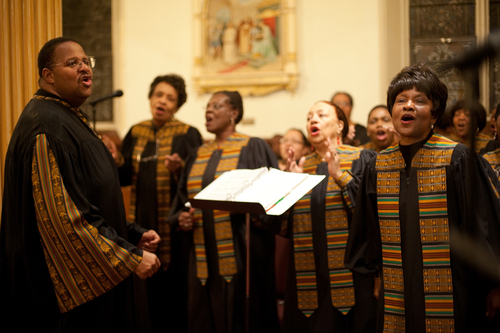Musicians serving at Sunday Mass have an important responsibility to choose music that maintains the integrity of our ritual prayer. In order to do this, they must be fully aware of the rhythm, flow and intention of our liturgy. Pastors must ensure that both professional and volunteer musicians serving in their parish are given ongoing opportunities to grow their understanding of Sunday Mass.
The first task of the liturgical musician is to choose a song that matches each given musical moment in the ritual. To choose music that is not integral to the Mass compromises the intentions of the ritual. Yet, without realizing it or without proper training in reflecting upon it, many musicians, volunteer or professional, by the music choices they make, often shift the liturgy’s intention. “Sacred music will be the more holy the more closely it is joined to the liturgical rite” (CSL #112).
Two helpful guides for musicians in the study of the Mass are the General Instruction of the Roman Missal, and the U.S. Catholic Bishops’ (2007) “Sing to the Lord: Music in Divine Worship.” (STL)
“Those responsible for preparing music for the celebration of the Eucharist…must have a clear understanding of the structure of the liturgy. They must be aware of what is of primary importance. They should know the nature of each of the parts of the Mass and the relationship of each part to the overall rhythm of the liturgical action.” (STL # 137)
The Mass is a set pattern of communal action in worship of God by a people committed to being the body of Christ on earth. This inherited ritual, which the people of the church have held in high esteem for hundreds of years, is our responsibility. It is our job to maintain its integrity for our time. Sunday Mass is not just individuals praying in the same building at the same designated time. In our communal worship, our individuality is assumed into the wholeness of Christ, the oneness of the body of Christ. Therefore, nearly all musical texts that focus on our private devotional lives, which might be appropriate for other prayer times, are generally not appropriate within the Sunday liturgy.
We need to be careful not to let our liturgy speak in the piety of a personal voice, in a way reflective of our 21st century individualistic culture. Remember, liturgy is the work of a people together, not of individuals individually. Its communal nature has something important to teach us about God, about ourselves as church, and about the message and mission of Jesus Christ.
Here are two example of textual types that would be considered individualistic, and non-liturgical:
- Consider the introductory rites at Mass: after our gathering song, and scriptural greeting by the presider, our first task together is confessional. We acknowledge that, as a people, we often fail to fulfill God’s will; that, as a people, we need God. In the penitential rite, we, who are the church, the one body of Christ, plead for God’s mercy. Now, consider the personal confessional nature of many contemporary Christian songs. If the message in the lyrics of a song are of an individual’s personal need for God, the piece is not well suited to the liturgy. It could be used for a reconciliation service or a non-liturgical prayer time, but it would only be appropriate at Sunday Mass as a prelude, encouraging participants to begin their worship in a spirit of humble penitence. With all good intentions, musicians might use a personal confessional text as a meditation after the communion procession, yet this type of sung prayer at that moment in the Mass upsets the balance and flow of the ritual.
- Another example concerns assembly song during the communion procession. The texts of communion songs need to speak of participation in and as the one body of Christ. From the moment we step into the church building for Sunday Mass, we offer ourselves to Christ’s mission. Throughout the Mass, that offering becomes increasingly one with the whole body of Christ, past, present and future. If a Sunday musician wants to use a piece of music that speaks of personal commitment to God, it would not be appropriate at the sharing in communion since, by that point in the liturgy, we have completely surrendered our individuality and given ourselves over to the body of Christ. We have “become what we receive” (St. Augustine). As with the first example, a song text about personal commitment might be used best as a prelude before Mass begins.
These are just two examples of how parish musicians must always be attentive to the communal nature and balance of the liturgy. For further training in liturgical music, please contact the Office for Worship at [email protected].
Start your day with Always Forward, our award-winning e-newsletter. Get this smart, handpicked selection of the day’s top news, analysis and opinion, delivered to your inbox. Sign up absolutely free today!

